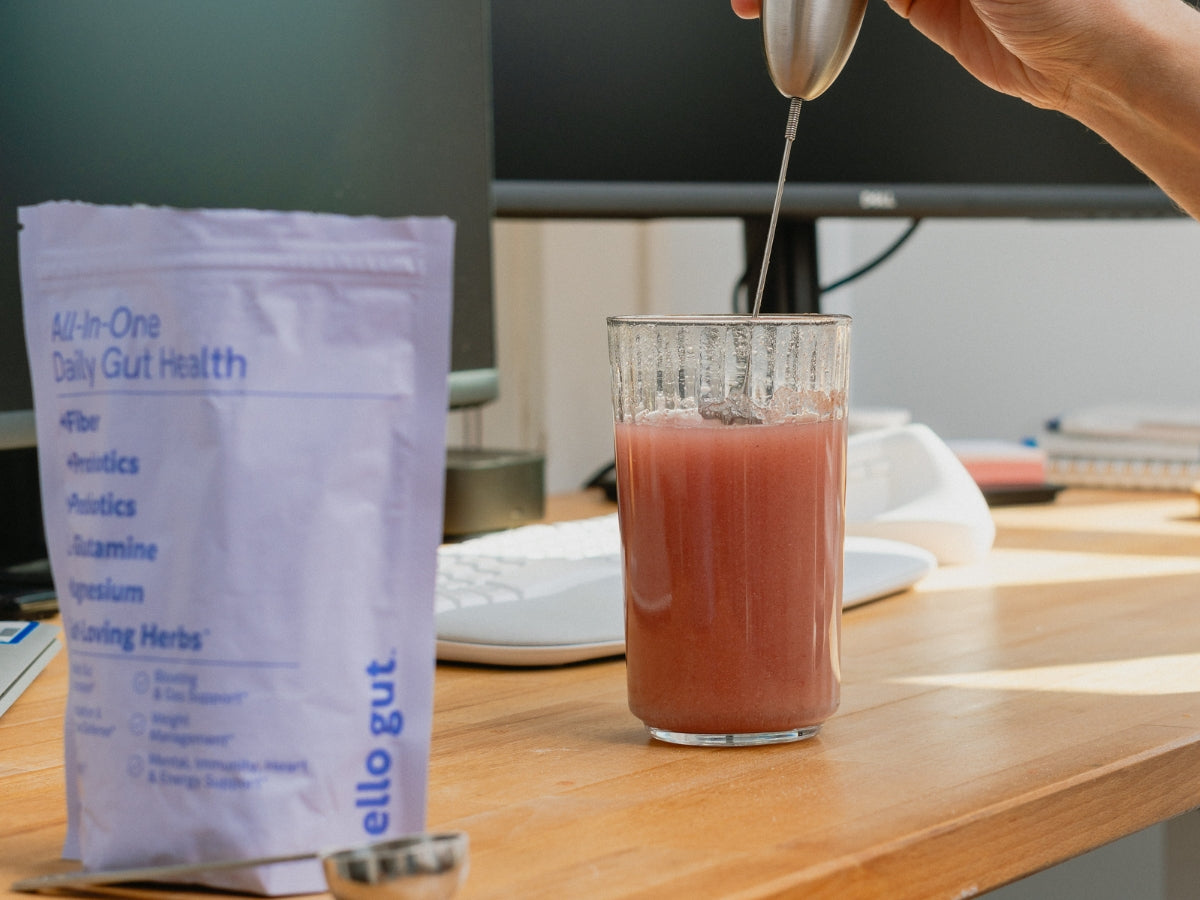Whether you are a competitive athlete, casual gym-goer, or even a Sunday rec. league legend, we all want to perform and feel our best. What if the secret weapon for unlocking peak potential lies not in the gym, but in the gut? The latest research suggests that the gut can significantly improve athletic performance and recovery as the gut is pivotal in regulating energy production, nutrient absorption, hydration, immunity, and body inflammation—all of which are critical to athletic performance and recovery.
Short-Chain Fatty Acids
Let's start off by discussing the power of short-chain fatty acids. Short-chain fatty acids, also known as SCFAs, are a key component of the gut’s influence on athletic performance. You’ll see SCFAs mentioned frequently throughout this article, which signifies their importance. These compounds are produced when beneficial gut bacteria ferment prebiotic fibers in the colon. The most prominent SCFAs—butyrate, propionate, and acetate—play multiple roles in the body all of which are crucial for athletes.
Butyrate is known for its role in energy production, serving as the primary fuel for colonocytes, the cells lining the colon. This maintains the integrity of the gut barrier, preventing harmful substances from leaking into the bloodstream and triggering systemic inflammation (we’ll touch more on this later), a known hindrance to athletic performance and recovery.
Propionate contributes to energy regulation by supporting glucose production in the liver, helping maintain energy levels during prolonged exercise, which is essential for endurance.
Acetate can be converted into acetyl-CoA, which enters the tricarboxylic acid (TCA) cycle (also known as the Krebs cycle) to produce ATP, the primary energy currency of the cell. This process can occur in various tissues, including muscles, contributing to overall energy availability.
Together, these SCFAs not only support energy availability and metabolism but also exhibit powerful anti-inflammatory properties, reducing exercise-induced inflammation and facilitating quicker muscle recovery [1].
To increase the production of SCFAs, each serving of Hello Gut includes 8 grams of prebiotic fiber along with our carefully crafted probiotic blend. These fibers and probiotics work together to increase beneficial gut bacteria, promoting the creation of short-chain fatty acids.
Nutrient Absorption & Hydration
You’ve likely heard the saying, "You are what you eat." However, this only holds true if your body can effectively break down food and absorb its nutrients. The small intestine is lined with villi and microvilli (small finger-like projections) designed to maximize the absorption of nutrients such as carbohydrates, proteins, fats, vitamins, and minerals. These nutrients are essential for energy production, muscle repair, and overall physiological function.
However, the efficiency of this process heavily depends on the health of the gut lining and the integrity of the gut barrier. A healthy gut microbiome, the diverse community of beneficial bacteria within the digestive tract, plays a significant role in breaking down food into absorbable forms. It also aids in the synthesis of vitamins and minerals which are crucial for overall health and vitality [2].
Furthermore, the gut is integral to hydration, as it is the primary site for the absorption of water and electrolytes—like sodium, potassium, and chloride. These electrolytes are critical for maintaining fluid balance, nerve function, and muscle contractions. The gut lining’s integrity ensures that water and electrolytes are absorbed efficiently, preventing dehydration and supporting sustained physical exertion[3].
Our formula enhances these processes by incorporating prebiotic fibers such as psyllium husk and inulin. These fibers form a gel-like substance in the gut, which slows the movement of food, allowing for more thorough digestion and absorption of nutrients and electrolytes. L-glutamine, another key ingredient, supports the gut lining’s health, ensuring that nutrients and fluids are absorbed effectively. Additionally, magnesium malate aids in maintaining electrolyte balance, which is essential for muscle function and overall athletic performance [4].
Immune System
The gut houses around 75% of the body’s immune cells within the gut-associated lymphoid tissue (GALT), AKA 75% of your body’s immune system is located in your gut. The microorganisms in your gut interact with these immune cells to modulate both local and systemic immune responses. It produces antimicrobial substances and short-chain fatty acids that help maintain a balanced gut environment and strengthen the gut barrier. Keeping your intestinal gut barrier healthy is crucial for supporting your immune system. Your intestinal barrier is composed of tightly joined epithelial cells and immune components like IgA which allows nutrients in while blocking harmful pathogens.
Our modern American diet, along with intense training and other environmental factors can compromise this barrier ( this is often referred to as leaky gut), leading to increased gut permeability and inflammation, which can impair performance and recovery. Our probiotic blend, featuring strains like Lactobacillus acidophilus, Bifidobacterium longum, and Lactobacillus rhamnosus, is designed to reinforce this barrier. These strains enhance mucin production, tighten cell junctions, and boost IgA levels, providing a robust defense against pathogens and supporting immune function [5].
In addition to probiotics, ingredients like L-glutamine and prebiotic fiber also play essential roles in supporting immune health. L-glutamine is a critical fuel source for enterocytes, the cells that line the gut, and help to maintain the integrity of the gut barrier. By preventing "leaky gut," L-glutamine reduces the risk of systemic inflammation and supports overall immune function [4]. Fibers, such as psyllium husk and Jerusalem artichoke inulin, serve as prebiotics that nourish beneficial gut bacteria, promoting a healthy microbiome that further supports immune defenses.
Body Inflammation
The gut is also critical when it comes to regulating body inflammation, a key factor in athletic performance and recovery. The connection between gut health and inflammation lies primarily in the gut microbiome and the integrity of the gut barrier.
A healthy gut microbiome helps maintain a balance between pro-inflammatory and anti-inflammatory signals in the body. As previously mentioned, beneficial bacteria in the gut produce SCFAs, such as butyrate, which are known to have anti-inflammatory effects. Butyrate helps reinforce the gut barrier by supporting the cells that line the intestines. When the gut barrier is compromised, often due to an imbalanced microbiome or high levels of physical stress, it can cause leaky gut. This increased permeability allows toxins and pathogens to enter the bloodstream, which can lead to chronic body inflammation. For athletes, this kind of inflammation not only impairs performance and recovery but can also contribute to muscle damage and increase the risk of injury [6].
The ingredients in Hello Gut, such as the probiotic strains lactobacillus acidophilus and bifidobacterium longum, support a healthy gut environment by promoting the production of SCFAs and strengthening the gut barrier. These probiotics help to modulate the immune system, reducing excessive inflammatory responses and promoting a balanced, healthy reaction to physical stress. Additionally, L-glutamine, another ingredient in Hello Gut, plays a vital role in maintaining gut barrier integrity, further preventing the onset of systemic inflammation [4].
If you’re committed to reaching your full potential as an athlete, focusing on gut health is a non-negotiable. It can significantly improve your energy output, nutrient absorption, muscle recovery, and immunity, as well as decrease body inflammation. While Hello Gut offers powerful gut health support, it’s the combination of Hello Gut with a gut-friendly lifestyle that truly makes the difference. Take Hello Gut, eat high-fiber foods like fruits, vegetables, and legumes, stay hydrated, keep your electrolytes balanced, and move every day. These simple but effective habits can propel your performance and recovery to new heights.
References
1. Sales, K. M., & Reimer, R. A. (2023). Unlocking a novel determinant of athletic performance: The role of the gut microbiota, short-chain fatty acids, and "biotics" in exercise. Journal of sport and health science, 12(1), 36–44. https://doi.org/10.1016/j.jshs.2022.09.002
2. Barone, M., D’Amico, F., Brigidi, P., & Turroni, S. (2022). Gut microbiome–micronutrient interaction: The key to controlling the bioavailability of minerals and vitamins? BioFactors, 48(2), 307–314. https://doi.org/10.1002/biof.1835
3. Barkas, F., Liberopoulos, E., Kei, A., & Elisaf, M. (2013). Electrolyte and acid-base disorders in inflammatory bowel disease. Annals of gastroenterology, 26(1), 23–28.
4. Kim, M. H., & Kim, H. (2017). The Roles of Glutamine in the Intestine and Its Implication in Intestinal Diseases. International journal of molecular sciences, 18(5), 1051. https://doi.org/10.3390/ijms18051051
5. Abdulqadir, R., Engers, J., & Al-Sadi, R. (2023). Role of Bifidobacterium in Modulating the Intestinal Epithelial Tight Junction Barrier: Current Knowledge and Perspectives. Current developments in nutrition, 7(12), 102026. https://doi.org/10.1016/j.cdnut.2023.102026
6. Aleman, R. S., Moncada, M., & Aryana, K. J. (2023). Leaky Gut and the Ingredients That Help Treat It: A Review. Molecules (Basel, Switzerland), 28(2), 619. https://doi.org/10.3390/molecules28020619





